Part 2 - Politics and Immigration
As befits a country that's really four countries but not really, the UK's politics are insanely complex. A large part of this is because, unlike almost every other country on Earth, the UK has no written constitution. The UK's "Constitution" is, theoretically, made up of its combined jurisprudence and case law, but in reality it's whatever any particular politician wants it to be. Attempts have been made to write one, but they have met with opposition because it was believed (absolutely correctly) that this would devolve into an attempt by various political parties and special interest groups to have their ideology hard-coded into the country so it couldn't be voted out. This is symptomatic of the fact that nobody really knows what Britain is about, or at least those that think they know happen to think that "what Britain is about" coincidentally lines up perfectly with their personal politics.
Essentially, any government can do anything it wants if it has a majority in parliament and it's MPs are loyal (which is the case 99% of the time), and they often do. Much of the current constitutional complexity/chaos can be traced back to Tony Blair, who leveraged his massive majorities into wild, unplanned constituntional tinkering that created all kinds of imbalances and issues that are still being fought over today. In theory, the laws that Parliament passes are restrained by Britain's membership of the European Convention on Human Rights and Britain's own Human Rights Act, but as Parliament could vote to leave the ECHR and repeal the HRA, it's not really as much of a restraint as it might seem. This fragility was demonstrated by Brexit - in theory, Britain was restrained in what laws it could pass by EU law, but one Brexit vote later, that was all in the bin and the UK could do whatever it wanted again.
Boring PolSci Stuff - The National Parliament
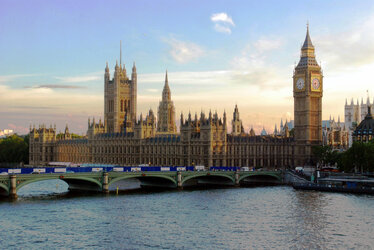
The UK's national parliament, like most, has two chambers, an upper and lower house:
Lower House - The House of Commons
This is the UK's equivalent to the American House of Representatives, though the selection/voting process for MPs (Members of Parliament, equivalent to Congressmen) is slightly different. The UK is not federal, and so rather than 50 states, it is split into 600-ish "Constituencies", each of whom elects a single MP. Each constituency has its own election at a General Election, and whichever candidate gets the most votes, gets to be that area's MP, even if they got way less than 50% of the vote (given the UK has way more than 2 political parties, this is the case 90% of the time). The leader of any party that gets more than 50% of those constituencies is invited by the Queen to form a government. If no party gets more than 50% of the constituencies, this is known as a "Hung Parliament" and the parties get to squabble and try to form a coalition. This has happened only once officially since WWII (in 2010), but often a ruling party with a small majority may lose MPs for various reasons and lose its majority, in which case it usually forms a semi-formal pact with enough small parties (usually the Northern Irish ones) to stumble through to the next election. A General Election must be held at most every 5 years (this has only been in law since about 2011, and could be altered at any time).
The leader of the winning party, or the biggest party in a coalition, gets to be the Prime Minister. Because the Monarch is the Head of State and does not participate in politics or decision-making, this gives the Prime Minister the effective powers of both. UK Prime Ministers are MUCH more powerful than US presidents, and the only check on their power is Parliament. But if they can bully 50% or more of their MPs into agreeing with them (seeing as they can eject them from the party for disloyalty, they certainly can), they can pass any law they want, up to and including abolishing democracy altogether if they feel like it. These days, Prime Ministers (starting with Blair) have found all kinds of loopholes that effectively allow them to rule by decree anyway, turning Britain into an elected dictatorship in all but name. This is very different from most other European parliaments, who elect MPs based entirely or partly on voting percentages, resulting in powerless, unstable coalitions, or no functional government at all (Belgium hasn't had a formal government AT ALL for nearly a decade now, and most Belgians agree that this is a good thing). YMMV on which is worse.
The Prime Minister and their Ministers (Secretaries of State in the US) must be Members of Parliament to hold office. They don't have to be members of the House of Commons though, and seeing as both the Monarch and the Prime Minister have the power to appoint people to the House of Lords without asking anyone, ministers can be parachuted into the Lords to take office if their constituents are rude enough to vote them out. The last Prime Minister to be a member of the House of Lords was Alec Douglas-Home in 1963 (and that was only temporary after the PM was too unwell to continue in office to the next election) but unelected appointees are still regularly promoted to Ministers to this day.
Upper House - The House of Lords
This is the UK's equivalent to the US Senate but has MUCH less power. When a Bill (a proposed law) is passed by the House of Commons, it goes to the House of Lords. The most the House of Lords can do is send it back to the House of Commons to have another go and propose changes. They can only delay a bill by 2 years at the most, at which point the House of Commons can use a little-used power to force it through anyway.
The Lords used to be consist of the senior Bishops of the Church of England (expelled by Blair), the country's most senior judges (spun off by Blair into a separate Supreme Court), hereditary aristocrats (barred from voting by Blair) and a handful of political appointees. Thanks to Blair, the Lords now consists entirely of politcal appointees, most of whom are complete scum who couldn't get elected as MPs for being too repellent or rich political donors rewarded by their parties.
Regional Parliaments and Assemblies
OK, here's where it gets stupid. Tony Blair (him again) ran for office on a programme of devolving power to Wales, Scotland and Northern Ireland, in the hope that he'd get votes and that the grateful peons of these places would fill them with Labour representatives. By and large, this was not what happened.
The Scottish Parliament

The Scots, by virtue of being the whiniest, got the biggest and most powerful parliament. The result has been a constitutional mess, with staggering imbalances in power (mostly at England's expense), overspending and corruption. They couldn't even build their own (hideous) parliament building properly. It was scheduled to open in 2001 and cost about £25 million. It finally opened in 2004 having cost a jaw-dropping £414 million, the bill largely footed by the English. This has been the ongoing theme of Scottish devolution ever since.
Labour quickly lost its majority to the Scottish National Party, who have maintained an iron grip ever since. Since Healthcare and Education are two of the main policy areas devolved to Holyrood, the SNP started giving their citizens massive gibsmedats in order to maintain their grip on power, and got the English to pay for it via the notorious "Barnett Formula" which gives substantially more UK taxpayer money to Scotland than Scotland generates itself. The Scots get free medical prescriptions and free university education, paid for, without any say, by the taxpayers of England. English students studying in Scotland have to pay. This is somehow not racist.
Until 2015, Scottish MPs sitting in the House of Commons still got to vote on Healthcare and Education issues in the national parliament even though English MPs had no say on the same matters in Scotland.
The Welsh Assembly
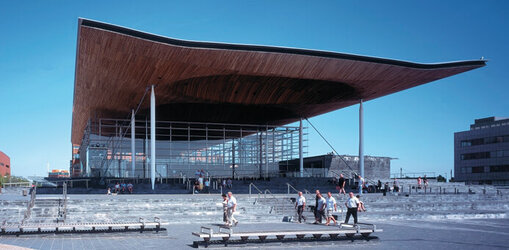
As befitting Wales, their "Parliament" was small and depressing, and of course leaked (English) money like a sieve. They didn't have say over education, but were given the keys to the Welsh NHS, which they proceeded to run into the ground. Wales has the worst health service anywhere in the country, even Northern Ireland which is a literal warzone with no government at all most of the time. (I'll cover the UK's Health and Education systems separately, as I know they are incredibly different from their US equivalents and hard to understand).
The Welsh are as enthusiastic about their Assembly as they are about everything else, i.e. not in the slightest. S4C, the local Welsh Language TV channel, had a daily programme called "The Point" about that day's happenings in the assembly. (Well, its English translation is "The Point", in Welsh it's probably called something like "Gwllpgllwthnyllyndthrhyllpgwyllncllyllgwth"), which became the first TV programme in British history to be watched by literally nobody at all. It is now known by S4C journos as "What's the Point?"
The Northern Irish Assembly
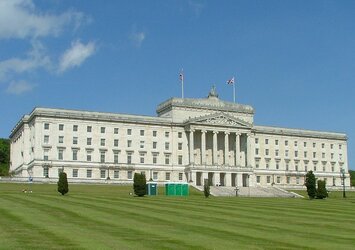
Hoo boy...
Unlike Scotland and Wales, Northern Ireland did have its own Parliament before the Blair Years, which was abolished in 1972 due to its total inability to keep the fucking place from descending into anarchy. It was ruled directly by London (which went down about as well as you'd expect) until 1998 when Blair revived it as part of his devolution agenda and the ongoing peace negotiations. (Actually, Blair had very little to do with it, it was his Northern Ireland minister Marjorie "Mo" Mowlam who managed to bang everyone's heads together despite suffering from brain cancer at the time. She died in 2005. The cynical might suggest that trying to untangle Northern Ireland's politics and get its resident apes to talk to each other rather than fling poo would be enough to give anyone brain cancer).
The resulting "Government" is unstable, incompetent and utterly ineffective. It has only been active about half the time since its formation, because one or more of its constituent parties keep walking out over stupid bullshit. All these "principled stands" result in Northern Ireland being ruled by London again most of the time, which I'm not sure is what the parties involved are ideally striving for.
As an example of the effectiveness of the Assembly, its First Minister, the DUP's Arlene Foster was recently forced to resign as it was revealed that during her time as Business Minister, she had set up a renewable energy incentive scheme to subsidise green energy use by business. However, it turned out that the subsidy provided amounted to more than the energy in question actually cost businesses, and so companies were renting empty warehouses just to fill them full of electric heaters and heat empty air as much as possible to get free money.
At least it's in a nice building, unlike the others.
Britain's Political Parties
The Conservative Party
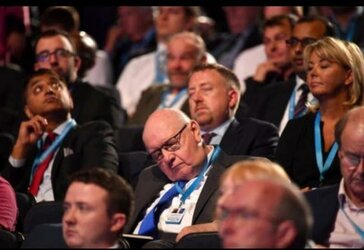 Associated Cows: None that I know (please correct me because I'm sure there are plenty)
Associated Cows: None that I know (please correct me because I'm sure there are plenty)
The Conservaties (known to everyone as the "Tories", derived from an old Irish term for a cattle rustler) are the main center-right party in the UK, and stand for office everywhere except Northern Ireland. Despite what the BBC and Twitter would tell you, the Tories have been the default party of government for over a century. The last non-Tory leader to win an election who wasn't Tony Blair (who many in the Labour party accused of being a Tory anyway) was Harold Wilson in 1974.
The Tories have a well-deserved reputation for defenestrating their leaders once they become unpopular, and this has played a big part in their success. Even Margaret Thatcher was shown the door by her own MPs when it looked like she might lose the 1992 election (which the Tories went on to win). They also had a reputation for being hopelessly divided. Given the UK's weird voting system, parties have to cover huge amounts of political ground to get elected (much like American parties) and factionalism and infighting is pretty much constant. The Tories spent most of the last 50 years fighting about whether the UK should be part of the EU, a matter that was finally settled in 2020. Since then, the Tories have looked invincible, despite their leader, Boris Johnson, being an untrustworthy, back-stabbing liar who lost four journalism jobs for dishonesty and tried to hire thugs to beat up another journalist he had a dispute with.
Boris' "bumbling idiot" routine is 100% an act. He has been caught arranging for people to call his mobile during speeches so he can act all flustered, and even organised the sabotaging of a zipline so that he would dangle "helplessly" for a bit while waving a pair of British flags. Johnson is a ruthless, unprincipled man who would sell his own grandmother to gain power, and stabbed his lifetime friend and colleague David Cameron in the back to become Prime Minister. He once wrote two articles, one pro-Brexit and one anti-Brexit, on the eve of the referendum, and decided which he would publish at the last minute once he worked out which was more to his advantage.

Despite this, the Tories look set to rule Britain for a very long time to come thanks to the total disarray of their rival parties. Let's look at them:
The Labour Party
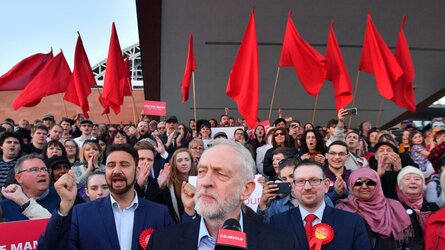 Associated Cows: Owen Jones, Liam "Lily" Madigan
Associated Cows: Owen Jones, Liam "Lily" Madigan
The Labour Party were born of the Trade Union movement in the 1920s, a period of severe industrial unrest, general strikes, and rioting. Advocating for industrial workers, they had brief periods of power in the 1920s but did not really make an impression until 1945, when Clement Attlee unseated Winston Churchill and created the NHS, as well as setting up the UK's welfare system.
After that, Labour did not see power again until the mid 1960s, and spent the next decade and a half alternating with the Tories in a series of increasingly unstable governments in an era of industrial strife and an economy crippled by over-powerful trade unions. By 1979 the public had had enough and elected Margaret Thatcher on a platform of putting the Unions down once and for all, which she certainly did. And again, despite what the BBC and Twitter would tell you, she had huge public support for doing so. So much so, in fact, that following Labour's embarrassing defeat in the 1992 election (where they were beaten by John Major, an inept dishrag of a man with the charisma of a breeze block), that they elected Tony Blair as their leader in 1994, who promised to make Labour electable at the expense of its founding principles, most notably removing the commitment to nationalising industry from Labour's constitution.
Blair was a huge success, winning 3 elections in a row and giving the Tories the biggest sustained electoral kicking in their history. But little did they know the rot was setting in. The rank and file of Labour's membership never really forgave him for his anti-nationalisation stand, and his enthusiastic support for and participation in the invasion of Iraq in 2003 made him hated by his own party to this day, despite being by far their most successful ever leader. Blair was succeeded by Gordon Brown, a man who made John Major look dynamic and youthful, and whose inept campaign seized defeat from the jaws of victory in 2010.
After that, Labour started to implode. A civil war broke out between the centrist, "Blairite" wing of the party and the old-school lefties. A compromise candidate in the weird and charmless Ed Milliband managed to lose the 2015 election despite standing against a massively unpopular coalition government and all hell broke lose during the following internal leadership election.
Miliband had tried to reverse Labour's falling membership by reducing the price to just £3 ($3.80). This membership included voting rights, and a leftist organisation calling themselves Momentum used this to infiltrate the party, as tens of thousands of dangerhairs and Communists signed up to propel unrepentant beardy Trotskyist Jeremy Corbyn to the Labour leadership. Corbyn, his dinosaur politics aside, was a useless leader whose solution to any problem was to form a committee about it and hope it went away. When the liberal media, notably the BBC, turned against him by exaggerating a real but fairly small problem with anti-semitism in the more bonkers corners of the party, Corbyn had absolutely no solution and the party descended into chaos. Despite this, he nearly unseated deeply unpopular Conservative Prime Minister Theresa May in the 2017 General Election, backed by a rare show of unity on Britain's Left and Tory apathy, but a change of Tory leader later that year, the successful passing of Brexit (on which he failed to ever utter a coherent position), and a confused and unpopular pro-immigration policy platform resulted in a brutal crushing in 2019 by Boris Johnson, stripping Labour of not only Blair's gains but even Northern mining towns that had consistently voted Labour since the 1920s.
Labour are now led by an unpopular compromise candidate in Keir Starmer, who has completely failed to prevent Labour descending into the kind of self-destructive civil war that followers of the Democrats will be familiar with. The hard left have left to the Greens, the centrists to the Liberal Democrats, and there is no reason to vote Labour any more whatever your opinion. They may be doomed.
The Liberal Democrats
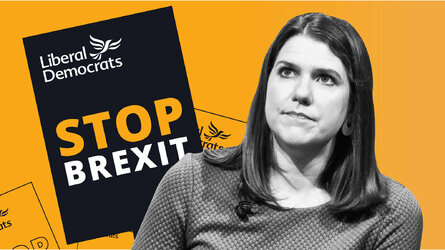 Bit late, love.
Associated Cows: Vordrak
Bit late, love.
Associated Cows: Vordrak
The Lib Dems (as they are known) are descended from the old Liberal Party, the second-oldest party in the UK after the Tories. But they are not in a good way. The Lib Dems, as the (often distant) third party in British politics, had the advantage that they could propose pretty much any policy no matter how impossible, implausible or unaffordable, and never be held to their promises. This was enough to gain them strong traction amongst students and places like South-West England and Northern Scotland, i.e. remote places full of hippies who were not exposed to the country's real problems. In general they offered a more center-left, liberal, progressive platform that the more socialist Labour party, while trying to appeal to the more libertarian wing of the Tories by being big on civil liberties and restraining government power.
But in their finest hour, the Lib Dems committed suicide in spectacular fashion.
Gordon Brown lost the 2010 General Election, but David Cameron's Tories didn't quite manage to win it, resulting in a Hung Parliament for the first time since 1974. Cameron was forced to form a coalition government with the Lib Dems under Nick Clegg, giving them their first taste of national power since the 1920s.
One of Tony Blair's more unpopular policies was his introduction of tuition fees for university (yes, Americans, going to university was fucking FREE in the UK until 1998 ). The Lib Dems, opportunist as ever, came out strongly against this policy while the Tories supported it. This bolstered the Lib Dem student vote to unprecedented levels, gaining them 51 seats in 2001 and a record 62 in 2005.
As part of the coalition negotiations, Clegg agreed to side with the Tories, against his own manifesto promises, to keep tuition fees. The Lib Dems' strategy of promising everything to everyone without consequence was about to destroy them, as during a key vote where the Tories proposed to increase them, and Labour tabled an amendment to abolish them altogether, the Lib Dems abstained in one of the most spectacular acts of political cowardice ever seen in this country's history.
The result was that the Lib Dems went from 57 seats in 2010 to just 8 in 2015. Annihilation. They still haven't recovered, managing a pathetic 11 seats in 2019. They recently gained another seat in a by-election (an election in a single constituency triggered by the death or resignation of the sitting MP) by loudly opposing a proposed railway line running through the middle the constituency, despite being in favour of said railway line in every vote so far in the UK parliament, demonstrating that they have learned exactly nothing.
The UK Independence Party
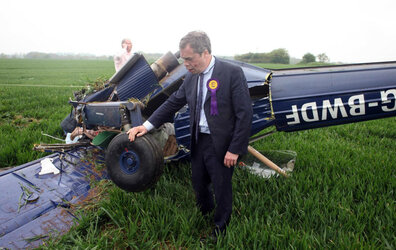 Associated Cows: Sargon of Akkad
Associated Cows: Sargon of Akkad
UKIP was formed in the late 1990s from the ashes of the Referendum Party, a small party that ran in 1997 with only one policy - a Brexit referendum. UKIP was just another fringe party until former stockbroker Nigel Farage took over. At the time, UKIP was also a one-policy party - that policy being Brexit, obviously. This attracted an unlikely set of supporters - libertarian Thatcherites who thought the EU was too Socialist, hardcore Communists who thought the EU wasn't Socialist *enough*, and "Ingerlund" types who thought the whole thing involved way too many smelly foreigners. This plunged the party into a three-way civil war from the outset that Farage needed to fix.
Farage was, at heart, a member of the libertarian faction, but he could see the way the winds were blowing and with the hilarious end of the (genuinely) far-right British National Party in 2009* he seized his chance to unite UKIP behind an anti-immigration platform. The result was transformative, and whilst never formally achieving power, UKIP went on to change British politics forever.
In 2010, Gordon Brown was recorded by a journalist calling a constituent who had asked a question about immigration a "bigoted woman" and Farage realised he could take votes from Labour just as much as the Tories. UKIP surged in the 2010 election and caused absolute chaos, resulting in the 2010 coalition because he was leeching votes from both main parties. In 2017, Tory defections nearly cost Theresa May the general election, forcing the Tories to shift to the Right to counter him. And of course he was instrumental in winning the Brexit referendum, as well as hoovering up former Labour votes in 2019 to contribute to their merciless shoeing in that year's election that may have destroyed the Labour party forever.
Without Farage, UKIP are nothing. He left once and was forced to come back as his pet project descended into chaos, but with the Brexit referendum won and its main purpose achieved, he retired. The result has been UKIP descending to the point that they put Carl "Sargon of Akkad" Benjamin and Count Dankula up as serious candidates.
*Nick Griffin, the BNP's then-leader (who is fat and who I would not have sex with), appeared on BBC national political debate show "Question Time" in 2009 despite howls of protest from the usual suspects about not "platforming" him. He made such a complete fool of himself (top quote - "Yes I did share a stage with the Grand Wizard of the KKK but he was totally non-violent") that the BNP died overnight, disappearing entirely a couple of years later when they forgot to renew their registration paperwork. The fact that this incident clearly demonstrated the folly of "no platform" policies for extremists and provided unequivocal proof that sunlight is indeed the best disinfectant, has of course been memory-holed.
The Scottish National Party
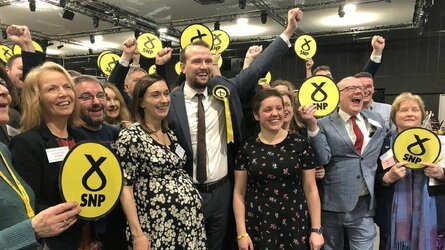 Associated Cows - None I'm aware of
Associated Cows - None I'm aware of
The Scottish Nationalists were always around, but Labour held an iron grip on Scotland until Tony Blair was foolish enough to give them their own parliament. Blair's centrist policies went down badly with the generally very left-leaning Scottish voters, so the SNP began to clean up, first taking control of the new Holyrood regional parliament then ripping into Labour's general election votes in Scotland, so badly so that Labour were beaten into fourth place in Scotland in 2019, winning just a single seat and being even less popular than the Tories (the Scottish hatred of the Tories goes back to Thatcher's time, when she would use Scotland to "try out" deeply unpopular policies before deciding whether to unleash them on everyone else).
The SNP agitated for, then narrowly lost, the 2014 Scottish Independence referendum. They are now using Brexit as justification for agitating for another one. Basically the SNP wants to keep having referendums until they win one, at which point there will mysteriously no further needs for more referendums. How democratic.
The SNP have kept their iron grip on Scotland by bribing their voters with other people's money. As I noted before, the SNP use English subsidies to fund expensive populist policies in Scotland. When asked how they expect this to continue after independence, they make vague noises about nationalising the North Sea oil fields that are largely off the Scottish coast. This seems to be a bit optimistic given that:
a) They have nearly run out
b) They are owned by private companies
c) Said private companies have substantial American shareholdings
So if the SNP do try to turn Scotland into Venezuela, they're going to have an American aircraft carrier moored just outside Inverness faster than you can say "General Pinochet". It will be interesting to watch though.
What sort of people run the SNP? Well, last year it emerged that an internal conspiracy by leader Nicola Sturgeon and a number of her loyalists contrived to trump up false rape allegations against the former leader Alex Salmond (apparently you need to be named after a fish to lead the SNP) to the extent of having him put on trial. Salmond was found not guilty and announced his intention to go on a legal rampage against Sturgeon and his accusers.
None of this has affected the SNP's popularity in any way. Make of that what you will.
Plaid Cymru (pronounced "plied cum-ree")
 Associated Cows: Are you kidding? That would make them interesting.
Associated Cows: Are you kidding? That would make them interesting.
Like everything else Welsh, the Welsh Nationalist Party is half-arsed, apathetic and embarrassing. Proper, pro-independence Welsh Nationalism died in the 1970s, and now Welsh "Nationalism" consists of whining to and about the English in search of more gibs, in particular subsidies to prop up their dying language which seems to have a terminal case of consonant poisoning.
Unlike the SNP, PC has never managed to seize the reigns of power in either the Welsh Assembly or the Welsh seats in the national Parliament, ineffectively whining and sniping and the spectacularly inept Labour administration in the Assembly as they run the entire country into the ground.
I don't know who their leader is and I genuinely can't be bothered to look it up.
The Green Party
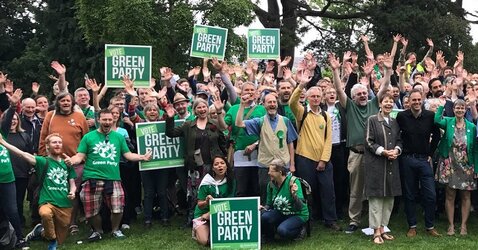 Associated Cows: Aimee Challenor
Associated Cows: Aimee Challenor
Troons! Furries! Communism! De-industrialisation! Abolishing the entire criminal justice system! A deliberate policy of economic contraction! If you enjoy these things you might want to vote Green, but then you also might want to ingest bleach. With Corbyn gone from Labour, the Greens have become the party for Twitter addicts, dangerhairs and gender activists. Their policies are utterly insane, and in 2015 their Leader, Natalie Bennett, had a hilarious meltdown during a radio interview when asked very basic questions about what the party's policies actually were and how they would be paid for. See if you can get through this:
Recently the Greens got into hot water when paedo diaper troon Aimee Challenor became its deputy leader. She was quietly removed and retired to be a reddit admin, where she continued to sow chaos and discord.
The relatively high electoral popularity of the Greens (and I mean relatively, their only parliamentary seat is in Brighton and that's because Labour and the Lib Dems don't field candidates there) mostly comes down to naive voters not looking up their policies and assuming they stand for being nice to the environment rather than a set of policies that make Stalinism look reasonable.
---
Next I'm going to do Northern Ireland. It's bound to make someone angry, it always does. Not today though, I'm knackered.
Jesus, you lot are still griping over that? What a way to hold a grudge.
We'll stop mentioning it as soon as you do.





















